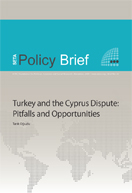As the Cyprus dispute continues to damage Turkey’s relations with the European Union, Turkey urgently needs to define its strategy in case that the ongoing inter-communal talks on the island fail to produce a comprehensive settlement soon. Both the prospects of Turkey’s membership in the EU and the institutional relationship between the EU and NATO will be at risk so long as the stalemate on the island continues. How should Turkey behave in response to EU’s demand that Ankara opens its ports and airports to Greek Cypriot vessels and aircrafts? How should one read the emerging Turkish position that the talks on the island cannot last forever and the two communities should reach a settlement by the spring of 2010? What can (should) the international community do in order to facilitate the final solution? Are there enough reasons on the ground to suggest that a final settlement on the island is just around the corner? These are timely questions and require urgent responses.
The Cyprus dispute continues to occupy the agenda of Turkey’s foreign policy, as the continuation of the deadlock on the island slows down Turkey’s European vocation and impairs the institutional relationship between the EU and NATO. Turkey’s decision to close its ports and airports to the Greek Cypriot vessels and aircrafts until the time the EU keeps it promises of easing the trade sanctions on the Turkish Republic of Northern Cyprus led the EU to partially suspend the accession negotiations on eight chapters in December 2006. Ankara holds that the adoption of the Additional Protocol in July 2005 does not imply that Turkey recognizes the Republic of Cyprus as the only sovereign authority on the island. On the other hand, the EU expects that Turkey implement the Additional protocol to the Association Agreement and normalize its relations with the Republic of Cyprus as soon as possible. From the EU’s perspective Turkey is under an obligation to extend its Customs Union with the EU to the Island. While this particular issue is still dividing the parties concerned, the two communities on the island have begun a negotiation process in late 2008 aiming at reaching a comprehensive settlement. Assuming that the parties on the island reach a settlement soon, Cyprus will likely drop out as an obstacle on Turkey’s EU membership process. That said, it is important to ascertain the possibility of the latest inter-communal negotiations to result in a comprehensive settlement. More important is to formulate Turkey’s policies in case the talks fail to produce a desired outcome...










